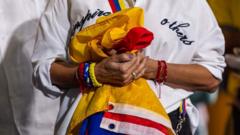The US State Department, led by Deputy Secretary Christopher Landau, has revoked visas for the band Los Alegres del Barranco after they projected a tribute to cartel leader El Mencho at a concert. This move reflects broader tensions surrounding narcocorridos and their cultural implications, as well as the US's firm stance against drug trafficking organizations.
US Visa Revocation for Mexican Band Over Controversial Cartel Tribute**

US Visa Revocation for Mexican Band Over Controversial Cartel Tribute**
Members of Mexican band Los Alegres del Barranco have had their US visas revoked by the State Department for glorifying a narcotics kingpin during a concert, igniting discussions on cultural expressions and crime.
The US State Department has taken a strong position on the cultural portrayal of drug lords in music, revoking the visas of members of the Mexican band Los Alegres del Barranco. The decision follows an incident in which the band projected an image of El Mencho, the notorious leader of the Jalisco New Generation Cartel (CJNG), during a concert in Zapopan, Mexico. Deputy Secretary of State Christopher Landau emphasized that such public displays "extol criminals and terrorists," and reaffirmed the administration's commitment to curbing the influence of drug trafficking organizations in the United States.
Los Alegres del Barranco was set to perform at various venues across several US states, capitalizing on their popularity among Mexican-American communities. However, the concert that drew the ire of US authorities coincided with musical discussions on narcocorridos, a genre that often glorifies notorious drug traffickers. The specific song performed praised El Mencho as "a man of war who loves his family," presenting a romanticized image that raises questions about the effects of such narratives.
The band is not alone in this controversy; many norteño music groups frequently compose songs linked to cartel figures, with financial incentives often coming from drug barons themselves. One notable previous composition by Los Alegres, titled "The 701," lauded Joaquín "El Chapo" Guzmán, drawing from his notorious past and wealth. The cultural footprint of narcocorridos highlights the conflicted relationship between artistic expression and the stark realities of organized crime in Mexico.
Mexican President Claudia Sheinbaum condemned the band’s actions, declaring that "this shouldn't happen, it's not right," and called for an investigation into their practices. The scrutiny comes as communities in Mexico cope with the ongoing violence tied to drug cartels, with recent discoveries of horrific sites linked to the CJNG amplifying public outrage.
The fallout from the concert raises broader questions about the role of music in society, particularly in relation to crime, identity, and the narratives we choose to uphold. As international diplomacy also plays a role in this discourse, the interactions between culture and politics continue to shape the way such issues are perceived by the public both in Mexico and abroad. The story serves as a reminder of the complex connections between artistic freedom and the moral quandaries posed by glorifying figures associated with violence and crime.





















